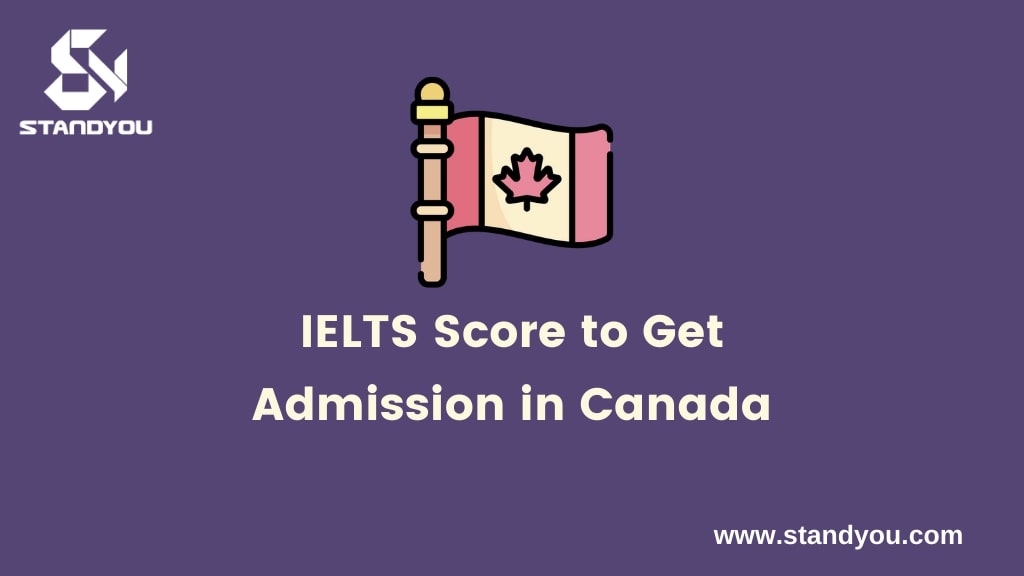Check out the IELTS score you need to get into Canadian Universities. ....

Jun 24, 2020 02:55:51

Canada is among the popular study abroad destinations for international students. In fact, the number of international students studying in Canada has nearly tripled in the last ten years. Canada is one of the most highly developed countries in the world. Canada is also ranked no.1 in the world for its quality of life.
Indian students play a huge role in Canada’s educational sector. If you are an Indian student who plans to study in the best universities or colleges of Canada, then you must be aware of the fact that you need to take the IELTS for admissions in Canada and score the required minimum score.
Before starting with the scores, let us first understand a little about IELTS. The IELTS or the “The International English Language Testing System” is an English language proficiency test that is conducted by the British Council. This test score is needed by students or employees whose primary language is not English and wish to study or work in a country where the primary language of communication is English. IELTS scores are trusted by more than 10,000 organizations. These include universities, employers, professional bodies, and migration authorities too. This exam can be taken a number of times by paying a nominal fee of INR 12,100 every time you take the test.
IELTS is of two types, namely Academic and General Training. Students who wish to study an undergraduate or postgraduate program in English Language speaking countries need to take the first one. The IELTS test can be taken on paper or on the computer. This English Language Requirements test consists of four sections, namely, listening, reading, writing, and speaking. One reason why many prefer to take IELTS is that unlike other English language proficiency tests where test-takers talk to a machine during the “Speaking Test”, the IELTS allows the test taker to talk to an examiner face-to-face in a relaxed environment. Also, it places emphasis on the student’s ability to communicate effectively in English in authentic and real-life situations.
Listening:
|
Paper format |
There are four parts with ten questions each. The questions are designed so that the answers appear in the order they are heard in the audio. The first two parts deal with situations set in everyday social contexts. In Part 1, there is a conversation between two speakers (for example, a conversation about travel arrangements), and in Part 2, there is a monologue in (for example, a speech about local facilities). The final two parts deal with situations set in educational and training contexts. In Part 3, there is a conversation between two main speakers (for example, two university students in discussion, perhaps guided by a tutor), and in Part 4, there is a monologue on an academic subject.
|
|
Timing |
Approximately 30 minutes |
|
No. of questions |
40 |
|
Task types |
A variety of question types are used, chosen from the following: multiple choice, matching, plan/map/diagram labelling, form/note/table/flow-chart/summary completion, sentence completion. |
|
Answering |
Test takers write their answers on the question paper as they listen and at the end of the test are given 10 minutes to transfer their answers to an answer sheet. Care should be taken when writing answers on the answer sheet as poor spelling and grammar are penalised. |
|
Marks |
Each question is worth 1 mark. |
|
Paper format |
Three reading passages with a variety of questions using a number of task types. |
|
Timing |
60 minutes. |
|
No. of questions |
40 |
|
Task types |
A variety of question types are used, chosen from the following; multiple-choice, identifying information, identifying the writer’s views/claims, matching information, matching headings, matching features, matching sentence endings, sentence completion, summary completion, note completion, table completion, flow-chart completion, diagram label completion and short-answer questions. |
|
Answering |
Test takers are required to transfer their answers to an answer sheet during the time allowed for the test. No extra time is allowed for transfer. Care should be taken when writing answers on the answer sheet as poor spelling and grammar are penalized. |
|
Marks |
Each question is worth 1 mark. |
|
Paper format |
There are two Writing tasks and BOTH must be completed. |
|
Timing |
60 minutes. |
|
No. of questions |
2 |
|
Task types |
In Task 1, test takers are asked to describe some visual information (graph/table/chart/diagram) in their own words. They need to write 150 words in about 20 minutes. In Task 2, they respond to a point of view or argument or problem. They need to write 250 words in about 40 minutes. |
|
Answering |
Answers must be given on the answer sheet and must be written in full. Notes or bullet points are not acceptable as answers. Test takers may write on the question paper but this cannot be taken from the examination room and will not be seen by the examiner. |
|
Paper format |
The Speaking test consists of an oral interview between the test takers' and an examiner. All Speaking tests are recorded. |
|
Timing |
11-14 minutes. |
|
Task types |
There are three parts to the test and each part fulfills a specific function in terms of interaction pattern, task input, and test-takers output. |
The test score of IELTS are between 0 and 9 and are available in the band score table.
|
Band score |
English level |
Description |
Key points |
|
9
|
Expert User |
Has complete command in the English language; accurate, appropriate, highly flexible, fluent with full understanding. |
Accurate, Full-Understanding |
|
8 |
Very Good User |
Has complete command with only rare errors (which are unsystematic) or inappropriate words. Deals with complex situations well but has rare error complex situations but can deal with detailed argumentations. |
Rare Error, Using Complex Language Well |
|
7 |
Good User |
Has a good command of English but also has occasional inaccuracies, misunderstanding or inappropriate words. Can use complex language quite well and understands detailed argumentations quite well. |
Only occasional errors, uses complex language quite well in most situations |
|
6 |
Competent User |
Has effective command of English but also has some errors, inappropriate words and misunderstanding in some situations. Can use complex language quite well but best in familiar situations. |
Some errors, uses some complex language which is best in familiar situations |
|
5 |
Modest User |
Has partial command of English and can deal with overall meaning. Make frequent errors. Has better English in common situations. Does not deal with complex language well. |
Frequent errors, has difficulties with language |
IELTS score plays a very important role in getting admission to a Canadian University, and almost every Canadian University requires students to submit an IELTS score. Students who apply for a Canadian visa for undergraduate study would need a minimum IELTS overall score of 6 and a score of 5.5 in all segments. Students applying for a graduate program need minimum average IELTS scores of 6.5 and a score of 6 in each segment. For the Student Direct Stream Program, the minimum IELTS score required is 6.0 or higher in each skill (reading, writing, speaking, and listening). However, the minimum IELTS score may vary from University to University and from program to program. Here is a list of top Canadian Universities that require an IELTS score:
|
College/university |
Total IELTS score |
|
Athabasca University |
6.5 |
|
University of Toronto |
6.5 |
|
McGill university |
6.5 |
|
Oxford university |
6.0 |
|
University of British Columbia |
6.5 |
|
University of Alberta |
6.5 |
|
University of Victoria |
6.5 |
|
University of Ottawa |
6.5 |
|
Canadian National Institute of Health |
6 |
|
Royal Roads University |
5.5 |
|
St. Thomas University |
6.5 |
|
University of Trinity College |
6.5 |
|
Vancouver Island University |
6 |
|
McMaster university |
6.5 |
A good IELTS score can also have other benefits such as:
Increase your Express Entry point- A good IELTS score is one of the ways to improve Express Entry Point. Also called the Comprehensive Ranking System, these points are awarded to candidates who wish for a permanent residence in Canada. The points are awarded on the basis of language ability, age, work experience, etc. Those who have a high IELTS score can get up to 160 Express Points.
Highlight your application form - Since most Canadian universities have a minimum IELTS score requirement, anything above the minimum would catch the eye of the admission committee.
Help get a Teaching Assistantship role - Students with a good score in IELTS along with other relevant qualifications will have higher chances of getting a teaching assistantship role than those with a lower IELTS score.
Taking the IELTS is a good way of ensuring your admission to your dream university in Canada. If you score well in the IELTS and have other relevant qualifications, who knows that you might even land a scholarship for your entire program and provide you with a chance to study in the best university of Canada.